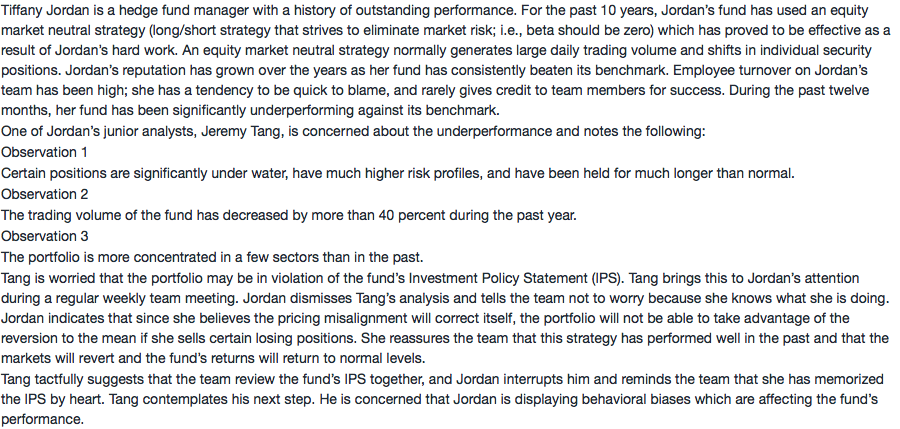NO.PZ201511190100000307
问题如下:
Tiffany Jordan is a hedge fund manager with a history of outstanding performance. For the past 10 years, Jordan’s fund has used an equity market neutral strategy (long/short strategy that strives to eliminate market risk; i.e., beta should be zero) which has proved to be effective as a result of Jordan’s hard work. An equity market neutral strategy normally generates large daily trading volume and shifts in individual security positions. Jordan’s reputation has grown over the years as her fund has consistently beaten its benchmark. Employee turnover on Jordan’s team has been high; she has a tendency to be quick to blame, and rarely gives credit to team members for success. During the past twelve months, her fund has been significantly underperforming against its benchmark.
One of Jordan’s junior analysts, Jeremy Tang, is concerned about the underperformance and notes the following:
- Observation 1: Certain positions are significantly under water, have much higher risk profiles, and have been held for much longer than normal.
- Observation 2: The trading volume of the fund has decreased by more than 40 percent during the past year.
- Observation 3: The portfolio is more concentrated in a few sectors than in the past.
Tang is worried that the portfolio may be in violation of the fund’s Investment Policy Statement (IPS). Tang brings this to Jordan’s attention during a regular weekly team meeting. Jordan dismisses Tang’s analysis and tells the team not to worry because she knows what she is doing. Jordan indicates that since she believes the pricing misalignment will correct itself, the portfolio will not be able to take advantage of the reversion to the mean if she sells certain losing positions. She reassures the team that this strategy has performed well in the past and that the markets will revert and the fund’s returns will return to normal levels.
Tang tactfully suggests that the team review the fund’s IPS together, and Jordan interrupts him and reminds the team that she has memorized the IPS by heart. Tang contemplates his next step. He is concerned that Jordan is displaying behavioral biases which are affecting the fund’s performance.
Which of Tang’s findings is not a typical consequence of self-control bias?
选项:
A.Failure to explore other portfolio opportunities.
B.Asset allocation imbalance problems in the portfolio.
C.A higher risk profile in the portfolio due to pursuit of higher returns.
解释:
A is correct.
Failing to explore other opportunities is a demonstration of status quo bias, not self-control. Self-control bias occurs when individuals deviate from their long-term goals, in this case, the investment policy statement, due to a lack of self-discipline. Jordan is not adhering to the strategy which has been successful in the past. The consequences of self-control bias include accepting too much risk in the portfolio (C) and asset allocation imbalance problems (B) as Jordan attempts to generate higher returns.
为什么不选A
因为缺乏自我控制力,失去了追求长期目标的机会,不也就是错失其它机会




